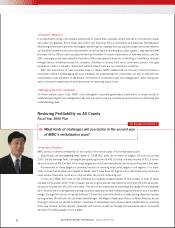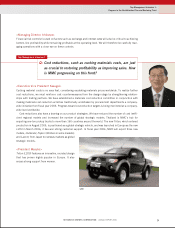Mitsubishi 2006 Annual Report Download - page 20
Download and view the complete annual report
Please find page 20 of the 2006 Mitsubishi annual report below. You can navigate through the pages in the report by either clicking on the pages listed below, or by using the keyword search tool below to find specific information within the annual report.
18 MITSUBISHI MOTORS CORPORATION ANNUAL REPORT 2006
Hiroshi Harunari
President and CEO of U.S.
subsidiary Mitsubishi Motors
North America, Inc. (MMNA)
since January 2006. Previously
appointed MMC Managing
Director in Charge of Overseas
Operations Group Headquarters
in June 2005.
Osamu Masuko
President
Concurrently in Charge of Over-
seas Operations Group Head-
quarters since January 2006
Roadmap for Improving Sales
Fiscal Year 2005: Brightness in Japan While the U.S. Has Yet to
Clear the Fog
Q: Let’s begin by asking President Masuko, who has been over-
seeing overseas operations since January 2006, about MMC’s
progress overseas. How were sales in fiscal year 2005, the
first fiscal year of the Mitsubishi Motors Revitalization Plan?
Could you provide a breakdown by region?
<President Masuko>
MMC performed very well in Europe. Retail sales climbed 10.5% year-on-year to 267,000 units, owing to steady
sales in the large German and U.K. markets, as well as substantial sales growth in Russia and the Ukraine.
However, in Asia and other regions, retail sales decreased 0.8% from the previous year to 664,000 units.
This decrease was mainly attributable to declining retail sales in Malaysia, which is promoting increased
production of domestic automobiles, and Indonesia, where economic conditions were weak due to high oil
prices. These declines were partially offset by growth in the strong markets of Thailand, Central & South
America, the Middle East and Africa.
In North America, retail sales declined 10.3% to 156,000 units. Sales were lower than forecast due to
falling sales in the U.S., despite strong sales in Mexico and Puerto Rico. High crude oil prices and other
factors are significantly transforming the operating environment of the automobile industry in the U.S. In the
prevailing environment, we believe that it is vital to establish a new operating structure that can respond more
dynamically to market conditions by engendering closer cooperation between MMC and U.S. subsidiary
Mitsubishi Motors North America, Inc. (MMNA). Hiroshi Harunari, formerly Managing Director in charge of
the overseas operations group, was dispatched to the U.S. in January 2006 to accelerate ongoing reforms.
Mr. Harunari will explain the current status of U.S. operations in more detail.
<MMNA CEO Harunari>
I regret that we were unable to deliver stronger performance in the U.S. in the first year of the revitalization
plan. The all-new
Eclipse
, for which we had high expectations as our first new model since the plan was
announced, generated strong sales. However, performance was affected by damage to the Mitsubishi brand
caused by past management missteps, and the fact that the launch period for the new
Raider
* pickup truck
coincided with a major surge in oil prices. In addition, ongoing efforts to reduce fleet sales as part of initia-
tives to normalize sales activities lowered volume. These factors were compounded by a drop in overall U.S.
automobile demand in the wake of events such as Hurricane Katrina in September 2005. In this climate, rival
automakers began providing special offers such as employee pricing campaigns to stimulate demand, trigger-
ing fierce competition in terms of the use of incentives. MMC was unable to sufficiently respond to these and
other disruptions in the U.S. market.
Top Management Interview 2
























